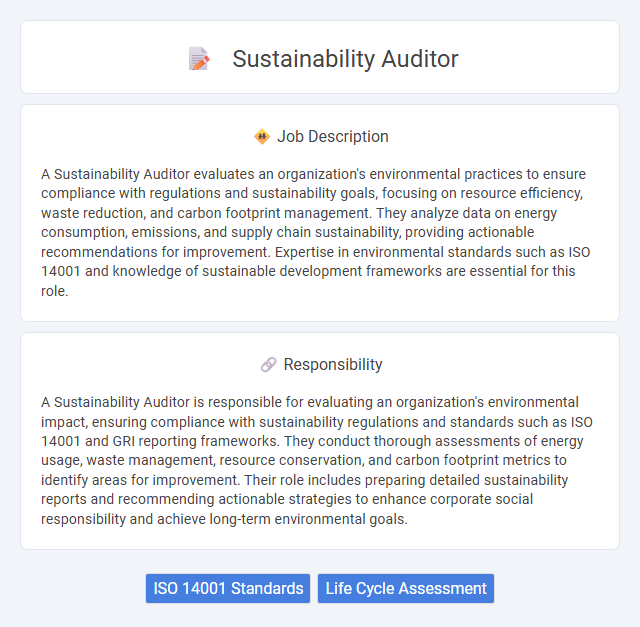
A Sustainability Auditor evaluates an organization's environmental practices to ensure compliance with regulations and sustainability goals, focusing on resource efficiency, waste reduction, and carbon footprint management. They analyze data on energy consumption, emissions, and supply chain sustainability, providing actionable recommendations for improvement. Expertise in environmental standards such as ISO 14001 and knowledge of sustainable development frameworks are essential for this role.
People with a strong commitment to environmental and social responsibility are likely to be suitable for the Sustainability Auditor role, as it demands careful evaluation of organizational practices. Candidates who possess strong analytical skills, attention to detail, and the ability to communicate complex sustainability data effectively may find themselves well-suited to the job. Those who thrive in roles requiring ethical judgment and continuous learning about sustainability standards probably have a higher chance of success in this position.
Qualification
A Sustainability Auditor must possess a strong background in environmental science, corporate social responsibility, or related fields, often supported by a bachelor's or master's degree. Proficiency in sustainability reporting frameworks such as GRI, SASB, and TCFD is essential to effectively evaluate company practices against global standards. Certification like Certified Sustainability Practitioner (CSP) or ISO 14001 Lead Auditor significantly enhances credibility and expertise in conducting thorough sustainability assessments.
Responsibility
A Sustainability Auditor is responsible for evaluating an organization's environmental impact, ensuring compliance with sustainability regulations and standards such as ISO 14001 and GRI reporting frameworks. They conduct thorough assessments of energy usage, waste management, resource conservation, and carbon footprint metrics to identify areas for improvement. Their role includes preparing detailed sustainability reports and recommending actionable strategies to enhance corporate social responsibility and achieve long-term environmental goals.
Benefit
Sustainability Auditors likely contribute significant value by identifying environmental and social risks within an organization, which can lead to improved compliance and reduced operational costs. Companies may benefit from enhanced reputation and stakeholder trust as auditors ensure adherence to sustainable practices and regulations. This role could also drive innovation by highlighting areas for resource efficiency and waste reduction, potentially boosting long-term profitability.
Challenge
A Sustainability Auditor likely encounters the challenge of continuously evolving environmental regulations and standards that require constant updating of knowledge and methodologies. Their role may involve scrutinizing complex supply chains to identify hidden sustainability risks, which can be resource-intensive and time-consuming. The probability of facing resistance from organizations hesitant to change established practices could further complicate the auditing process.
Career Advancement
A Sustainability Auditor evaluates corporate environmental, social, and governance (ESG) practices to ensure regulatory compliance and promote sustainable development. Career advancement opportunities include transitioning to senior auditor roles, sustainability consultant positions, or ESG compliance managers, often accompanied by certifications like LEED or GRI. Expertise in data analysis, regulatory standards, and sustainability reporting enhances prospects for leadership roles within multinational corporations and environmental organizations.
Key Terms
ISO 14001 Standards
A Sustainability Auditor specializing in ISO 14001 standards evaluates organizations' environmental management systems to ensure compliance with international environmental criteria. They conduct thorough assessments of processes, documentation, and operational practices to identify areas for improvement in sustainability performance. Expertise in ISO 14001 enables auditors to guide companies in reducing environmental impact, enhancing resource efficiency, and achieving certification requirements.
Life Cycle Assessment
A Sustainability Auditor specializing in Life Cycle Assessment (LCA) evaluates the environmental impacts of products from raw material extraction to disposal, ensuring compliance with sustainability standards. They analyze energy consumption, emissions, resource use, and waste across each stage of the life cycle to identify improvement opportunities and reduce carbon footprints. Expertise in software tools like SimaPro or GaBi enhances accuracy in reporting and supports corporate sustainability goals.
 kuljobs.com
kuljobs.com